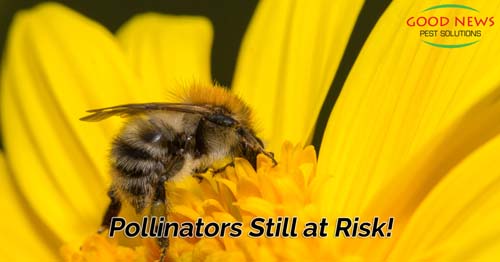
Pollinators Still At Risk
We all know now that nicotine in cigarettes is a highly addictive substance for human beings. So you might wonder why, just 20 years ago, companies started transitioning from standard insecticides to ones derived from nicotine.
The Potential Benefits
The answer is complicated. It has both to do with the much more harmful side effects of the existing chemicals, and the fact that the new substances – neonicotinoides – are highly soluble in water. That means the neonicotinoids, which literally means “new nicotine-like insecticides,” can be easily applied and absorbed by the ground. The plants take in the pesticide, eliminating the risk of contaminating other ground.
And that’s a good thing. The solubility reduces risks to beneficial insects. At least at first. Just like the nicotine in cigarettes, the neonicotinoids act on nerve receptors – one of the reasons a smoking addiction is hard to break. Allegedly, the products were considered safer for mammals, birds and other higher organisms, while toxic to invertebrates, like insects. And they believed that the absorption of the chemicals into the plants would filter its toxicity to bees and other pollinators.
Going Up In Smoke
But recently, studies are starting to analyze the effects of low-level exposure of neonicotinoids on bees. And the results are not good. While these chemicals may not be directly responsible for bee deaths, they do affect the bees. And not in a positive way.
Scientists are realizing neonicotinoids may impact some bees’ ability to foraging for nectar, as well as their memories. Bees may lose the ability to learn and remember where flowers are located and even their way home to the nest or hive.
A Growing Problem
While these studies cannot prove a connection between neonicotinoid exposure and bee colony collapse, there is enough causal evidence to recommend more studies. In fact, the findings were significant enough that last year the European Union banned the use of most neonicotinoids.
And just this month, Canadian researchers discovered neonicotinoids – particularly at low doses – stop bees from fending off varroa mites. Varroa mites kill bees by slowly feeding off their body fat and blood. They can also transmit a virus called deformed wing virus (DWV). And they are associated with more than 85% of bee colony losses.
Between 1980 and 2013, bee populations declined 33% across the planet. And while this is offset with a slight increase in pollinators for strictly agricultural areas, it still could point to a devastating environmental future if a solution isn’t found. 75% of crop species and 35% of global crop production is dependent in some way upon insect pollination. Clearly, we need another answer.
The good news is you don’t have to rely on neonicotinoid-based insecticides for your yard when you call Good News Pest Solutions. Our most popular service – Go Green Perimeter Plus – gives your home year round protection against the most common creepy crawlies, and it’s 100% organic. Our customers from Bradenton to North Fort Myers love and recommend it! If you’d like to schedule an appointment for Go Green Perimeter Plus, or learn more about any of our risk-reduced products, just give us a call!
« Back to Blog
Proudly Serving
Sun City Center, Ruskin, Palmetto, Parrish, Ellenton, Bradenton, Anna Maria, Holmes Beach, Bradenton Beach, Longboat Key, Lakewood Ranch, University Park, Myakka City, Sarasota, Siesta Key, Osprey, Nokomis, Casey Key, Venice, Englewood, North Port, Port Charlotte, Punta Gorda, Arcadia
Things You Can Do
Pay Your Bill Online
Leave Us a Review
Request a Free* Termite Inspection
Stop Mosquito Bites
Get Rid of Rodents
Get a Termite Damage Warranty
Get Pest Control for Your Attic
Get Pest Control for Your Business Request Prayer
Corporate Address
1080 Enterprise Court, Ste A
North Venice, FL 34275
Call Now: (941) 412-9610
Text: (941) 412-9610
Fax: (941) 412-0080
